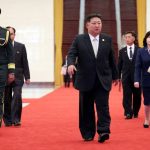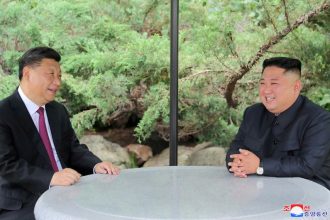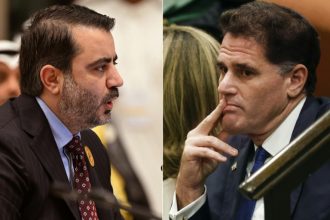President Donald Trump believes his alliance with Robert F. Kennedy Jr. created a political tent too big for the Democrats to beat. Trump is now trying to make sure Kennedy doesn’t push traditional GOP allies out.
That’s the biggest takeaway from the release Tuesday of Kennedy’s much-anticipated Make Our Children Healthy Again Strategy Report, which goes relatively easy on the vaccine, pesticide and food manufacturers whom Kennedy has made abundantly clear he believes are responsible for a crisis in children’s health.
The report calls for more studies than action, listing nearly 130 recommendations, from streamlining federal research into chronic diseases to investigating food ingredients to improving the childhood vaccine schedule.
And the strategy from Kennedy’s Make America Healthy Again Commission, which his supporters hoped would force industry to change its ways, didn’t include any surprise regulations. In a win for the farm and pesticides industries, it stopped short of restrictions on the chemicals which Kennedy and his MAHA movement allies have linked to health problems. In some areas, it advanced industry priorities that public health advocates say could increase the very health risks that have fueled the MAHA movement, such as accelerating reviews of new chemicals.
“We’re looking at economic impacts and health impacts and environmental impacts, and we’re trying to make a policy that is gonna work,” Kennedy said on Tuesday at an event launching the report, sitting next to Agriculture Secretary Brooke Rollins and several other administration officials, including EPA Administrator Lee Zeldin and the White House Domestic Policy Council Director Vince Haley.
The report shows how Trump, for all the outward support he’s lent Kennedy, has also reined in the firebrand anti-vaccine activist. Trump didn’t take part in a press conference to roll out the report after the White House held it for review for nearly a month. A White House official said that was for scheduling reasons. “He’s obviously still involved,” the official said of Trump’s interest in Kennedy’s agenda and his Make America Healthy Again movement. “He’s taking direct action on what the MAHA report talks about.”
Kennedy said he was due in the Oval Office later on Tuesday for a Trump announcement furthering the MAHA Commission recommendations, which Kennedy predicted would “challenge a lot of industries.”
As POLITICO has previously reported, senior Trump aides believe Kennedy’s Make America Healthy Again loyalists helped deliver the popular vote for Trump last November — and that keeping them in the GOP tent will be crucial to ensuring the party holds onto power in the midterms.
Trump hasn’t given any sign that he disagrees even as some top Senate Republicans showed growing discontent with Kennedy following his decision to push out the director of the Centers for Disease Control and Prevention two weeks ago.
After senators, including the second-ranking Republican in the Senate, John Barrasso of Wyoming, and the chair of the Health Committee, Bill Cassidy of Louisiana, questioned Kennedy sharply about that and his other vaccine policy moves at a hearing, Trump issued a sympathetic take.
“He’s got some little different ideas,” Trump said, adding that Kennedy “means very well.” But a day later, Trump also told reporters that he’s a believer in vaccination, thinks some of the shots are “amazing” and doesn’t think it’s a good idea to make them entirely voluntarily, as Kennedy wants to do.
Following Kennedy’s lead, Florida officials moved to end all vaccine mandates, including for schoolchildren, last week. The same day, Republican senators heard from Trump’s pollster, who said many vaccines — with the exception of Covid shots — enjoy overwhelming support among voters.
Trump’s endorsement of vaccination came in response to a question about Florida’s move. But three days later, Trump was back in Kennedy’s corner, sharing a post on his social media site highlighting a Kennedy ally’s view that a vaccine preservative Kennedy is moving to ban causes autism.
Still, it’s clear that Trump is also listening to other people in his coalition. Rollins and Zeldin, who are tight with farmers and chemical interests, got to weigh in on the new strategy.
A May assessment of the situation with children’s health from Kennedy said it’s in crisis and that it’s likely the result of ultraprocessed food, exposure to chemicals, lack of exercise, stress, and overprescription of drugs. Solutions for the health crisis would come within 100 days, Kennedy promised at the time.
Agriculture groups and farmers, traditionally Trump allies, lobbied the White House to convince Trump to protect them from Kennedy, arguing that letting him have free rein would hurt struggling farmers and drive up food prices. They worried in particular that Kennedy would take aim at Roundup, the brand name for glyphosate, which is the most commonly used herbicide in the world.
After dozens of meetings at the White House with MAHA Commission leaders, agriculture groups secured a private promise that the White House wouldn’t allow Kennedy to restrict the chemical or pesticides farmers use to protect their crops.
Kennedy in 2020 compared Roundup’s manufacturer to the Superman villain Lex Luther. “I’ve seen this company as the enemy of every admirable American value,” he wrote in a Facebook post.
But after meeting with farm state senators in June, Kennedy said he’s bent over backwards to assure farmers that he doesn’t have it out for them. “We’ve met with over 140 farm interests over the past three months to incorporate them to make sure that the MAHA agenda is consistent with their agenda,” Kennedy told Sen. Chuck Grassley (R-Iowa) last week after Grassley asked for reassurance.
After the strategy report’s release, pesticide makers expressed support.
“CropLife America appreciates this Administration and the MAHA Commission for inviting feedback and listening to America’s farmers and agriculture industry — and recognizing that pesticides are important tools that help farmers grow healthy, affordable, and abundant food for American families,” said Alexandra Dunn, president and CEO of CropLife America, the pesticides lobby.
Some Kennedy loyalists said they were disappointed. “This report is a major missed opportunity for the Trump administration and a clear sign that Big Ag, Bayer, and the pesticide industry are firmly embedded in the White House and intentionally short-circuiting Trump’s campaign promise to the millions of MAHA voters who helped him return to power,” said David Murphy, a former finance director for Kennedy’s presidential campaign and an advocate for stricter pesticide regulation. Bayer is the German manufacturer of Roundup.
Meanwhile, Republican lawmakers are writing provisions into bills to protect pesticide manufacturers from lawsuits, suggesting that for all the nice things they’ve said about Kennedy since Trump allied with him last year and named him health secretary, they don’t share some of his views.
“The White House has certainly gotten the message, both from agriculture and the food sector, that they are on the edge of a nanny state,” one food lobbyist told POLITICO ahead of the strategy’s release. “The message we’ve gotten from the White House is, ‘Don’t worry, we’re not letting the crazy people run rampant over the food sector.’”
Kennedy’s boasted about his wins — food manufacturers have promised to phase out food dyes Kennedy believes cause learning disabilities, and Coca-Cola has promised to introduce a version of its signature soft drink made with cane sugar, not corn syrup, for example — but few of the promises are locked in with the force of regulation.
Kennedy officials say they’re eschewing such rulemaking because it takes too long and they can’t trust career federal workers to write them.
Still, Kennedy insisted Tuesday that the list of recommendations he and the other members of the MAHA Commission put forward “are things I’ve been dreaming about my whole life.”
Kennedy claimed there’s never been a similar effort to reverse the growing rate of chronic disease in children and praised Trump for being willing “to challenge businesses when they overreach” while being “the most business-friendly president, probably in history.”
The health secretary said he spoke to the president many times about what’s afflicting kids and about how unpopular the solutions would be, because they hurt some businesses.
“And he said: ‘I don’t care. This is children,’” Kennedy recounted the president saying.









